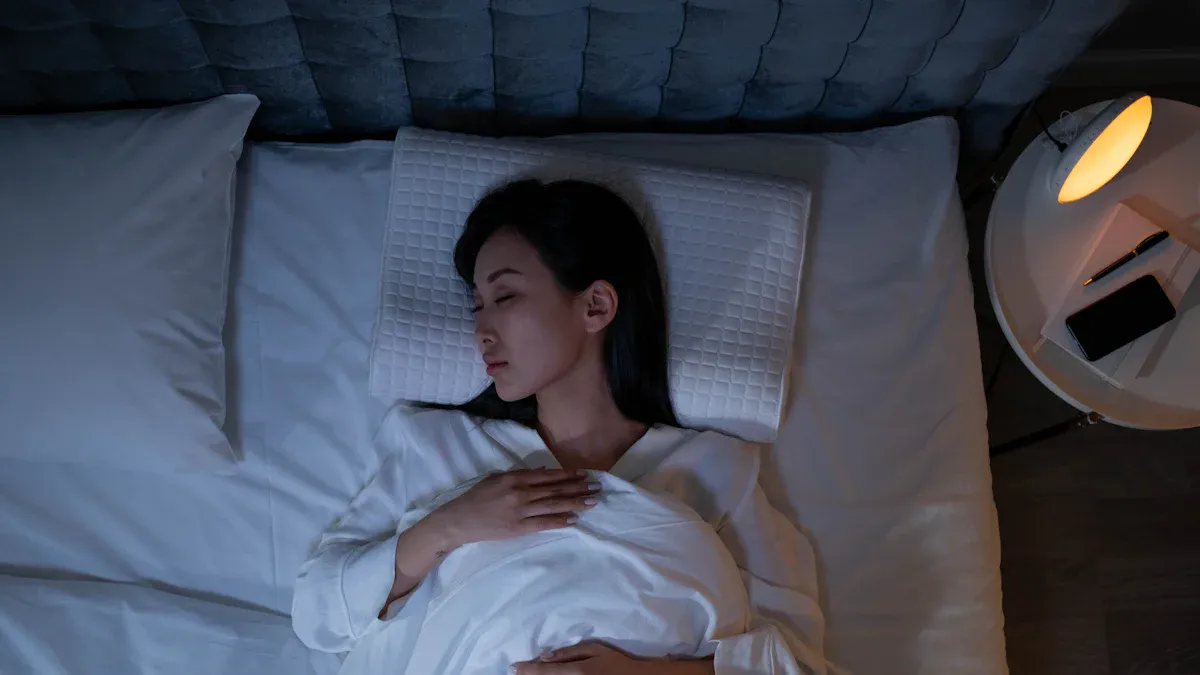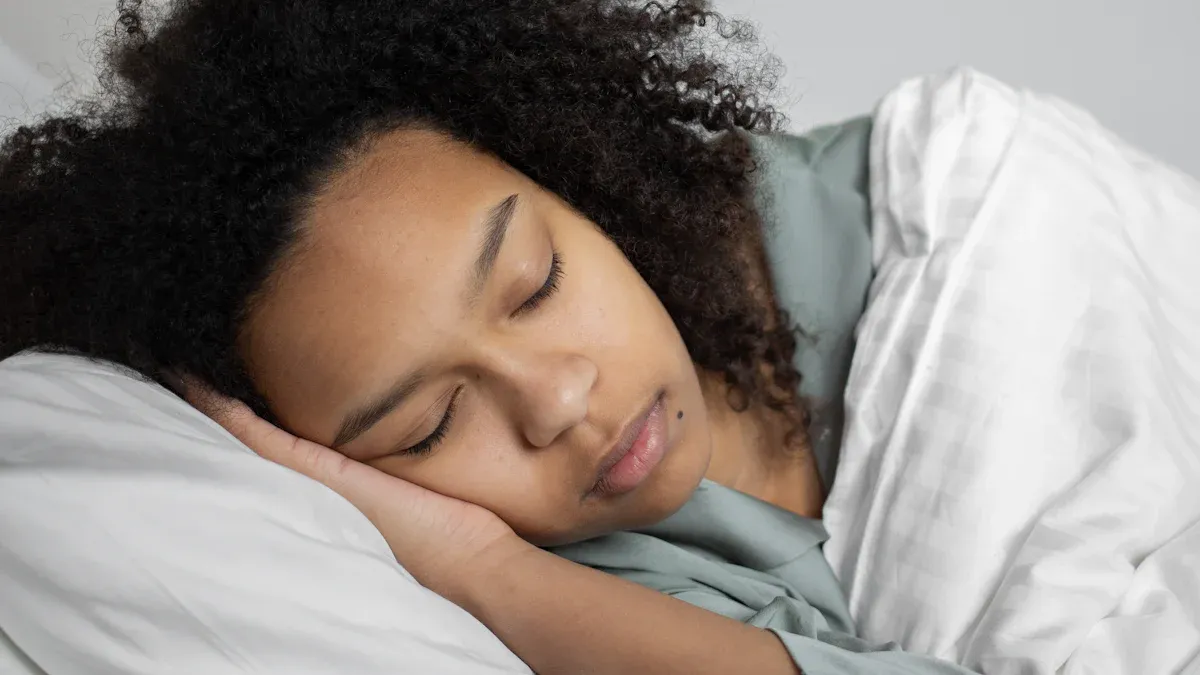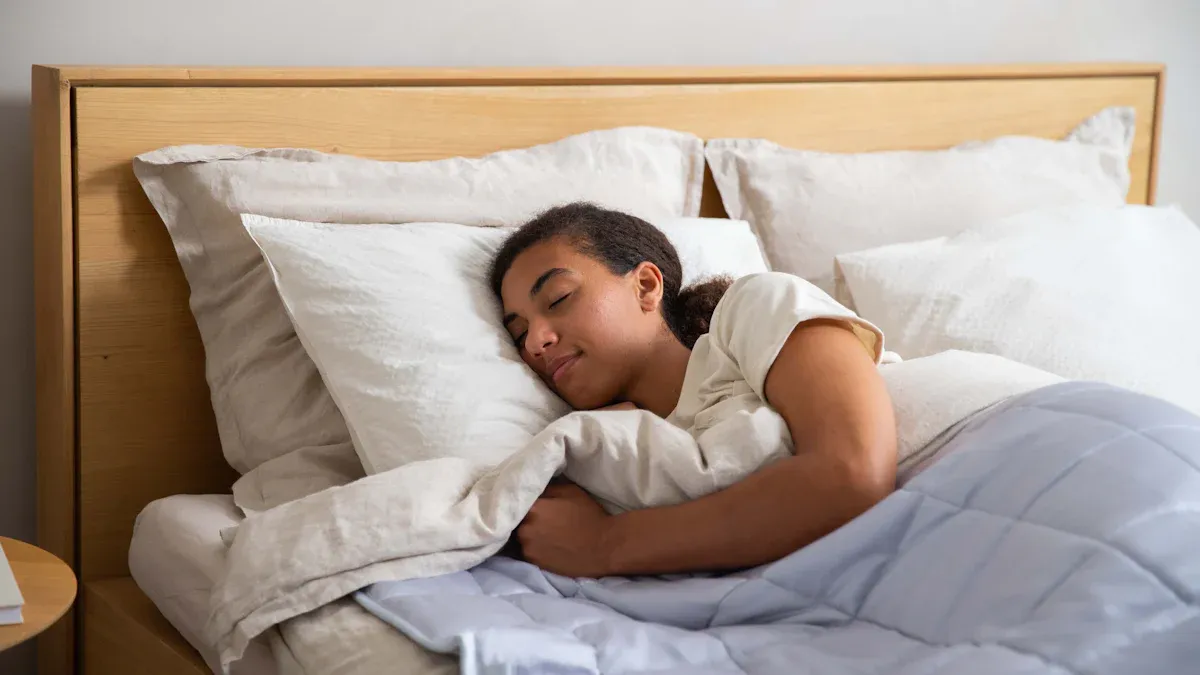
Deep sleep is like a reset for your body and brain. It fixes tissues, boosts your immune system, and improves memory. But getting enough deep sleep can be hard for many people. Did you know 38% of adults under 45 sleep less than seven hours? Not sleeping enough can make you feel sad or grumpy during the day. Over time, poor deep sleep can lead to serious health problems, like dementia. Don’t worry—there are easy ways to sleep better and learn how to increase deep sleep naturally. One effective method is using a ring to track sleep, which can provide insights into your sleep patterns and help you make adjustments for a more restful night.
Key Takeaways
-
Deep sleep is very important for staying healthy. It helps your body fix itself, makes your immune system stronger, and helps you remember things better.
-
Stick to a regular sleep routine. Sleeping and waking up at the same time every day teaches your body when to rest.
-
Make your bedroom cozy for sleeping. Keep it cool, dark, and quiet so you can sleep well.
-
Handle stress with calming activities. Try deep breathing or meditation to relax before bedtime.
-
Use tools like sleep trackers. These devices can show how you sleep and help you improve.
Why Deep Sleep Matters

The Role of Deep Sleep in Restorative Health
Deep sleep is when your body fixes itself. During this time, important things happen to keep you healthy:
-
Your immune system gets stronger. Research shows animals without sleep lose immunity and may die in weeks.
-
Muscles grow, tissues heal, and proteins are made mostly at this time.
-
Your brain clears adenosine, which helps you feel awake in the morning.
-
The glymphatic system removes brain toxins, lowering harmful proteins like beta-amyloid linked to Alzheimer’s.
How Deep Sleep Enhances Cognitive and Emotional Well-being
Deep sleep helps your brain stay sharp and emotions steady. Here’s what studies show:
|
What Was Studied |
What Was Found |
|---|---|
|
Sleep and emotions |
Poor sleep links to mood issues. REM sleep helps emotional memories. |
|
REM sleep effects |
REM sleep keeps emotional memories and uses special brain activity. |
|
Regular sleep habits |
Good sleep improves emotions and thinking, helping overall health. |
Getting enough deep sleep helps you think clearly and stay calm, making daily life easier.
Long-term Benefits of Prioritizing Deep Sleep
Making deep sleep a habit can help you long-term. Here’s how:
-
Better Mental Health: Good sleep improves mental health for many people.
-
Stronger Physical Health: Quality sleep lowers tiredness, pain, and improves life quality.
-
Lower Healthcare Costs: Sleep programs save money, especially for mental health care.
By focusing on deep sleep, you feel better now and stay healthier in the future.
Common Barriers to Deep Sleep
Stress and Its Impact on Sleep
Stress can make it tough to sleep well. When you're stressed, your body makes cortisol, a hormone that keeps you awake. This makes relaxing and falling into deep sleep harder. Big life changes or deadlines can mess up your sleep in unexpected ways:
-
High stress can shorten the time spent in deep sleep.
-
Feeling stressed before bed often causes waking up at night.
-
Even short-term stress, like a test, can lower REM sleep quality.
Some people feel stress more strongly than others. If you lie awake thinking about your day, you might be more sensitive to stress. This can lead to trouble sleeping or insomnia. Handling stress is important for better deep sleep and health.
Tip: Try calming activities like deep breathing or meditation before bed. These can help you relax and prepare for sleep.
Poor Sleep Hygiene Habits
What you do daily affects how well you sleep. Bad habits, like staying up late or using your phone in bed, can stop you from getting deep sleep. Research shows poor sleep habits can cause tiredness during the day and mental health problems.
|
Evidence Description |
Numbers |
Importance |
|---|---|---|
|
Daytime tiredness from bad sleep habits |
p = 0.001 |
|
|
Higher risk of mental health issues from tiredness |
OR = 3.65 (95% CI = 2.56-4.91) |
– |
|
Poor sleep linked to mental health problems |
OR = 4.76 (95% CI = 3.11-7.29) |
– |
|
Sleep issues in poor sleepers |
14.1% vs 7% |
– |
|
Bad habits (smoking, drinking, napping) in insomnia cases |
More common in insomnia group |
– |
If you feel sleepy during the day or can't fall asleep at night, check your habits. Easy fixes, like going to bed at the same time or avoiding screens, can help a lot.
Note: Good sleep habits aren't just for nighttime. What you do during the day, like skipping naps or avoiding caffeine, also matters.
Lifestyle Choices That Disrupt Deep Sleep
Your choices can help or hurt your sleep. Some habits and surroundings can stop you from getting deep sleep:
-
Too much caffeine or alcohol can mess up your sleep.
-
Bright lights, like screens or streetlights, confuse your body clock.
-
Not enough sunlight during the day can make falling asleep harder.
Other things, like work stress or parenting, can also affect sleep. About one in three adults sleep less than seven hours because of lifestyle issues. Social plans, late-night scrolling, and odd work hours can all hurt sleep quality.
Even where you live can impact sleep. Bad neighborhood conditions, shift work, or limited healthcare access can make sleep harder. If this sounds like you, know you're not alone. Spotting these problems is the first step to fixing them.
Tip: Build a bedtime routine to help you relax and signal sleep time. Small changes can greatly improve your deep sleep.
Health Conditions That Affect Deep Sleep
Some health problems can make deep sleep harder to get. These issues can mess up your sleep cycles, leaving you tired during the day. Let’s look at common health problems that may stop you from sleeping deeply.
Sleep Disorders
Problems like insomnia, sleep apnea, or restless legs syndrome can lower deep sleep. For example, sleep apnea causes breathing to stop and start at night. This keeps your body from reaching the deep sleep it needs. If you wake up feeling tired, a sleep disorder might be the cause.
Tip: Keep a sleep diary if you think you have a sleep problem. It can help you and your doctor find out what’s wrong.
Chronic Pain
Living with pain can make falling or staying asleep tough. Conditions like arthritis, fibromyalgia, or back pain can cause discomfort that breaks your sleep. When your body can’t fully relax, it struggles to reach deep sleep. Poor sleep can make pain worse, creating a hard-to-break cycle.
Mental Health Conditions
Anxiety and depression can also stop you from getting deep sleep. Anxiety keeps your mind busy at night, while depression changes how you sleep. Bad sleep can make these mental health problems worse, creating a difficult loop.
Neurodegenerative Diseases
Diseases like Alzheimer’s and Parkinson’s often cause sleep problems. Research shows older adults with less slow-wave sleep, which helps memory, have more tau protein. Tau protein is linked to Alzheimer’s. Watching your sleep patterns might help spot early signs of memory issues.
Hormonal Imbalances
Hormone changes, especially in women, can affect deep sleep. Menopause often causes hot flashes and night sweats, making sleep harder. Thyroid problems can also change energy levels and disturb sleep.
Cardiovascular and Metabolic Conditions
Heart disease, diabetes, and obesity can hurt your deep sleep. These conditions may cause discomfort or need medicines that mess up sleep cycles. For example, high blood sugar in diabetics can cause frequent bathroom trips at night, breaking sleep.
Note: If you have these health problems, talk to your doctor about your sleep. Small changes in treatment could improve your rest.
By learning how health problems affect deep sleep, you can take action. Whether it’s seeing a doctor, reducing stress, or fixing your sleep space, every step helps you sleep better and stay healthy.
Proven Strategies on How to Increase Deep Sleep

Establish a Consistent Sleep Schedule
Your body loves routines. When you go to bed and wake up at the same time every day, your internal clock, or circadian rhythm, stays in sync. This helps you fall asleep faster and enjoy more deep sleep. A study found that sticking to a structured sleep schedule reduces sleep time variability and aligns your body with its natural rhythms. This alignment is key to improving sleep quality and boosting the amount of deep sleep you get.
To start, pick a bedtime and wake-up time that works for you—even on weekends. Avoid sleeping in or staying up late, as this can confuse your body. If you’re not tired at bedtime, try relaxing activities like reading or listening to calming music. Over time, your body will adjust, and you’ll find it easier to drift into quality sleep.
Tip: Set an alarm not just for waking up but also for going to bed. This can help you stick to your consistent sleep schedule.
Optimize Your Sleep Environment for Better Rest
Your bedroom plays a big role in how well you sleep. A cozy, quiet, and dark space can make it easier for your body to relax and enter deep sleep. Research shows that improving your sleep environment can lead to better sleep quality, reduced anxiety, and even shorter time to fall asleep. Here are some ways to optimize your space:
-
Keep the room cool, ideally between 60-67°F.
-
Use blackout curtains or an eye mask to block out light.
-
Reduce noise with earplugs or a white noise machine.
-
Invest in a comfortable bed and pillows that support your body.
-
Improve air quality by using a humidifier or keeping windows slightly open.
These small changes can make a big difference in how to increase deep sleep. A comfortable bed and a peaceful environment signal your brain that it’s time to rest, helping you fall asleep faster and stay asleep longer.
Note: Avoid screens at least an hour before bed. The blue light from phones and tablets can trick your brain into thinking it’s daytime, making it harder to sleep.
Manage Evening Stimulants Like Caffeine and Alcohol
What you consume in the evening can either help or hurt your sleep. Caffeine and alcohol are two common culprits that disrupt deep sleep. Caffeine, found in coffee, tea, and chocolate, stays in your system for hours. Drinking it too late can keep you awake and reduce the time you spend in deep sleep. Studies show that even one cup of coffee can shorten your sleep by over ten minutes.
Alcohol might make you feel sleepy at first, but it actually lowers sleep quality. For every glass of alcohol, subjective sleep quality drops by over three points on a 100-point scale. It also disrupts your sleep cycles, making it harder to reach the deep sleep stage.
To improve sleep quality, avoid caffeine after 2 p.m. and limit alcohol in the evening. Instead, try herbal teas or warm milk to help you relax. These small changes can have a big impact on your ability to get quality sleep.
Tip: If you’re craving a late-night snack, choose something light and healthy. A heavy meal or sugary treat can also interfere with your sleep.
Practice Relaxation Techniques to Reduce Stress
Stress can make it hard to get deep sleep. When your mind is busy or your body feels tight, relaxing becomes tough. Relaxation techniques can help calm you down and prepare you for sleep.
Here are easy ways to relax before bed:
-
Deep Breathing: Breathe in through your nose for four seconds. Hold your breath for seven seconds, then breathe out slowly for eight seconds. This slows your heart and helps you feel calm.
-
Progressive Muscle Relaxation: Tighten and release each muscle group, starting at your toes and moving up to your head. This eases tension and helps you relax.
-
Meditation: Focus on your breathing or repeat a soothing word. Apps like Calm or Headspace can guide you through short, sleep-focused sessions.
-
Visualization: Imagine yourself in a peaceful place, like a quiet beach or forest. This can distract you from stress and help you fall asleep.
Tip: Add these relaxation methods to your nightly routine. Just 10 minutes can help you fall asleep faster and sleep better.
Incorporate Regular Exercise for Improved Sleep Quality
Exercise isn’t just good for your health—it also helps you sleep better. Staying active during the day makes your body more ready to rest at night. Regular exercise improves how well and how deeply you sleep.
Here’s how exercise helps:
-
Boosts Sleep Efficiency: Studies show exercise helps you sleep longer and fall asleep faster.
-
Improves Deep Sleep: Activities like brisk walking, cycling, or yoga can increase deep sleep.
-
Reduces Stress: Exercise lowers stress hormones, helping you relax and sleep better.
Timing is important. Working out too late can make you feel too awake to sleep. Try to finish exercising at least three hours before bedtime.
Tip: If you’re new to exercise, start small. A 20-minute walk or light yoga can still improve your sleep.
Use Technology to Monitor and Enhance Sleep
Technology can help you improve your sleep. Devices like the Aura Ring by VERTU track your sleep patterns and show what’s working or not.
The Aura Ring is more than just a ring—it’s a smart tool. It tracks things like sleep stages, heart rate, and blood pressure. Its advanced sensors give accurate data about your deep sleep and other sleep stages.

Note: A sleep tracker like the Aura Ring can show patterns and help you make changes for better sleep.
Consider Natural Sleep Aids and Supplements
Sometimes, your body might need extra help to sleep deeply. Natural sleep aids and supplements can be gentle ways to improve sleep. These remedies have been used for years and are supported by research. Let’s see how they work and which ones could suit you.
How Natural Sleep Aids Work
Natural sleep aids help your brain’s sleep cycle or relax your body. Supplements like melatonin copy the hormones that tell your body it’s bedtime. Herbal remedies calm your nerves and help you unwind. These aids are useful if stress, anxiety, or habits keep you awake.
Tip: Always ask your doctor before trying new supplements, especially with other medicines. Safety matters!
Popular Natural Sleep Aids and Their Benefits
Here are some common natural sleep aids and their benefits:
-
Melatonin: Helps fix your sleep cycle, especially after jet lag or shift work. It can help you fall asleep faster and stay asleep longer.
-
Valerian Root: Known for calming effects, it’s great for anxiety before bed.
-
Passion Flower: This herb helps you relax and improves sleep quality.
-
St. John’s Wort: Often used for mood issues, it can also help with sleep.
-
Kava Kava: Reduces stress and helps you sleep better.
These options can improve sleep without needing prescription drugs.
What Research Says About Natural Sleep Aids
Studies show how natural remedies affect sleep. Here’s a summary:
|
Natural Product |
How It Works |
Study Reference |
|---|---|---|
|
Polygalae Radix |
Improves sleep and changes brain activity |
Lee et al., 2013 |
|
Cordycepin |
Boosts brain waves needed for deep sleep |
Hu et al., 2013 |
|
St. John’s Wort |
Helps treat insomnia |
N/A |
|
Kava Kava |
Helps treat insomnia |
N/A |
|
Valerian |
Helps treat insomnia |
N/A |
|
Passion Flower |
Helps treat insomnia |
N/A |
These findings show natural aids can improve sleep and even deepen it. For example, Polygalae Radix changes brain activity, and Cordycepin increases waves needed for restful sleep.
Choosing the Right Supplement for You
Different sleep aids work in different ways. If falling asleep is hard, melatonin might help. If stress keeps you awake, try valerian or kava kava. For overall sleep improvement, passion flower or St. John’s wort could work.
Note: Start with a small dose and watch for side effects. Natural doesn’t always mean risk-free.
Making Natural Sleep Aids Part of Your Routine
Using a natural sleep aid can be easy. Take it about 30 minutes before bed. Pair it with relaxing activities like reading or meditation. This signals your body to wind down and prepare for sleep.
Natural sleep aids aren’t a quick fix, but they can help. When combined with good sleep habits, they can make mornings feel more refreshing.
When to Seek Professional Help for Sleep Issues
Spotting Long-Term Sleep Problems
Sometimes, sleep troubles last longer than just a few nights. Ongoing sleep problems can affect your health and daily life. If better habits haven’t helped, it may be time to get expert advice.
Here are signs your sleep issues might be serious:
-
It takes over 30 minutes to fall asleep most nights.
-
You wake up often and can’t fall back asleep easily.
-
You sleep less than six hours regularly and feel tired all day.
-
You feel sleepy, cranky, or have trouble focusing during the day.
Doctors use tools like the Insomnia Severity Index (ISI) to check sleep problems. A six-point score change shows big improvement, while under three points means little progress. Other measures, like cutting wake time by 20 minutes or sleeping 30 minutes more, also show long-term issues.
Tip: If these signs sound like you, keep a sleep diary. It helps you and your doctor see patterns and find solutions.
Visiting a Sleep Specialist for Answers
If sleep problems don’t go away, seeing a sleep specialist can help. They use special tests to find out what’s causing your sleep troubles.
Here’s what might happen during your visit:
-
Home Polysomnography (hPSG): This test checks your sleep at home. It tracks breathing, oxygen, and heart rate. It’s accurate and rarely fails.
-
In-Lab Polysomnography (PSG): Done in a sleep lab, this test records brain activity and muscle movements. It’s great for spotting complex sleep problems.
-
Home Sleep Apnea Tests (HSATs): These small devices check breathing and oxygen levels. They help find issues like sleep apnea.
These tests work well and give useful details about your sleep. Specialists can then suggest ways to improve your deep sleep.
Trying Medical Treatments for Better Sleep
If natural fixes don’t work, medical treatments might help. These are made to treat specific sleep problems and improve rest.
Here are some proven treatments:
|
Treatment Type |
How It Helps Sleep |
Effect Size |
|---|---|---|
|
Relaxation Techniques |
Better sleep quality |
Medium effect size |
|
Physical Exercise |
Small to large effects |
Varies |
|
Mind-Body Exercises |
Positive results |
Varies |
|
Tai Chi |
Medium to large effects |
Varies |
|
Aromatherapy |
Helps improve sleep |
Varies |
Studies show ICU patients using sleep treatments slept longer, woke up less, and felt better rested. Things like Tai Chi and aromatherapy also greatly improve sleep quality.
Note: Always talk to your doctor before trying medical treatments. They can make sure it’s safe and right for you.
Deep sleep is key to staying healthy and feeling good. It helps your body heal, clears your mind, and keeps your mood steady. You can improve deep sleep by making small changes. Try going to bed at the same time, fixing your bedroom, and calming your stress. These steps can make a big difference over time. If you still have trouble sleeping, ask a doctor for help. Deep sleep isn’t just about feeling awake—it’s about living better and happier. Start working on your sleep today!
FAQ
What is deep sleep, and why is it important?
Deep sleep is the most restorative sleep stage. Your body repairs tissues, strengthens the immune system, and clears toxins from your brain during this time. It’s essential for feeling refreshed, improving memory, and maintaining overall health. Without it, you may feel tired and unfocused.
How can I tell if I’m getting enough deep sleep?
You might feel well-rested and alert during the day if you’re getting enough deep sleep. Sleep trackers like the Aura Ring by VERTU can also help. They monitor your sleep stages and provide insights into how much deep sleep you’re getting each night.
Can stress really stop me from sleeping deeply?
Yes, stress can keep your mind racing and prevent your body from relaxing. This makes it harder to enter deep sleep. Try relaxation techniques like deep breathing or meditation before bed to calm your mind and prepare for restful sleep.
Are natural sleep aids safe to use?
Most natural sleep aids, like melatonin or valerian root, are safe when used correctly. Always start with a small dose and consult your doctor, especially if you take other medications. Natural doesn’t always mean risk-free, so it’s better to stay cautious.
Does exercise really improve deep sleep?
Absolutely! Regular exercise helps you fall asleep faster and increases the amount of deep sleep you get. Just avoid working out too close to bedtime, as it might leave you feeling too energized to relax.
Tip: A brisk walk or light yoga during the day can work wonders for your sleep quality.
 Free Shipping Worldwide
Free Shipping Worldwide 24/7 Customer Support
24/7 Customer Support Pay Over Time with PayPal & Klarna
Pay Over Time with PayPal & Klarna




